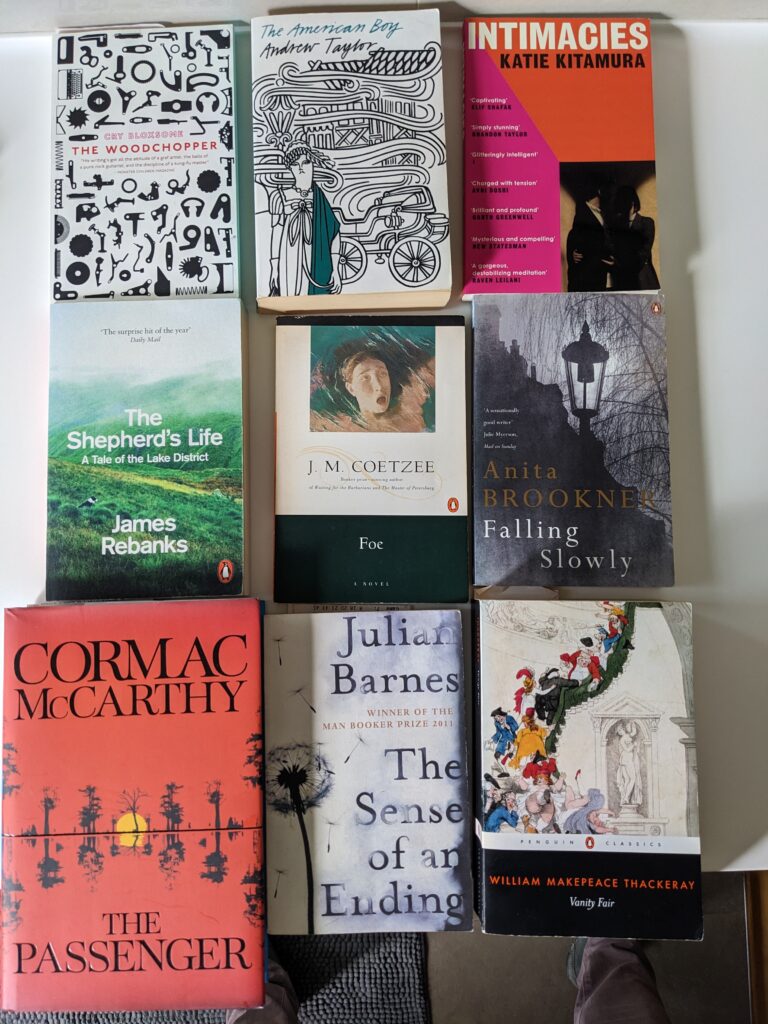
The Woodchopper (2008 – another Op Shop grab) by Cry Bloxsome was fun and forgettable. A self-published (nothing on the internet at all about it) edgy, Oz-crime story of a man arriving in Perth to investigate his brother’s apparent murder. Meets a secretive recent partner and a bunch of dodgy crimimal types who all seem suspicious really. Becomes an (unwilling?) sexual plaything of a lady geologist who has needed info, and raised everyone’s hackles generally. Let’s move on – 2 stars.
The American Boy by Andrew Taylor (2003) delivered the period drama, intrigue and length that I absolutely needed after the casual, slapdashery of the last book. Tightly written and plotted, the murderous antics of these cutthroat Recency period chaps in London were gripping – the story was beautifully revealed. Gripping and enthralling – 4.5 stars.
I’d read the reviews and heard the podcasts and yet I still thought it was wonderful. Katie Kitamura‘s Intimacies (2021) is about the non-belonging of an expatriate woman in the Netherlands working as an interpreter in the Hague. It’s a dreamy meditation that reminded me of the (also amazing) Milkman novel I read last year. Completely compulsive. 5 stars.
You need to pick the right time of year or mood for a book like James Rebanks‘ The Shepherd’s Life (2015). It quickly became captivating to me for it’s description of the physicality and volume of work on a sheep farm in the fells of Yorkshire; a niche industry that’s been insulated from large scale commercialisation due to the terrain. It’s like reading a story from the 1800s but then realising it’s still going on right now. Delightful – I follow him on Twitter now. 4 stars.
Luckily it was short because I may have tossed it if it was 300 pages. Foe (1986) by Coetzee was a reimagining of Robinson Crusoe, and although when I flick through it now a few months later, I see lots of good writing, and the basis for a great story, but it was just a bit miserable to read really. I’m not recommending it to anyone! 3 stars.
The perceptive and claustrophobic considerations of Anita Brookner for her characters have made her pretty recognisable to me by now. I don’t think I’ve ever read anything like her for these lengthy and sometimes devastating analyses of character that’s she does. With Falling Slowly, it’s two sisters Beatrice and Miriam and there’s no shortage of commentary in the absence of action. I can see how people may find her dreary or limited to the domestic, but I always enjoy them. Another solid book – 4 stars.
The Passenger (2022) by 89 year old Cormac McCarthy has got to have the worst book cover I’ve ever seen, and was also a tough read (particularly the sister’s story). I can’t say I liked it at all, though there were bits of great writing or turns of phrase that I admired or was at least gripped to see what happened – i.e. the diving down to the plane wreck in the ocean, the visit to the disintegrating friend in the swamp. It was a bit of a mess though (his ridiculously sisterly obsession was just annoying by the end) and had too many unexplained fragments. Certainly not enough to make me care to read the sequel. 2 stars.
I swore decades ago that I wouldn’t read Julian Barnes again, after a disappointing novel, but enough time had transpired and it won the Booker and it was 150 pages. I felt like he had to pull quite a few tricks to make The Sense of an Ending (2012) work, but it was so fast paced and engrossing that I didn’t mind when I’d pretty much guessed the last minute gotcha. Absorbing and audacious, I’d recommend it for sure – 4.5 stars and wonderfully short.
Time for a classic I said; review on back cover says “the only English novel that challenges comparison with Tolstoy’s War and Peace” – wow I said. 800 pages I thought. Let’s go I said. Vanity Fair (1848) by William Makepeace Thackeray (like War and Piece) was very readable though it would have been nice to have a family tree or two to help make sense of all the Crawleys and Osbournes and the rest. Time after time I’d think, there’s the Bute Crawleys, the Pitt Crawleys and then Captain Crawley, Miss Crawley and Mrs Crawley – gah. The Introduction of the novel (which I read afterwards) was fantastic in its comparison with War and Peace (less battle scene glorification and generally very anti-war, unlike the Russian novel), but also pointed out the many character similarities in Thackeray’s life (he himself was a real-life Dobbin, which explains why that character was so exasperatingly honorable and tortured, and in pointing out weaknesses in many of the relationship depictions. What was refreshing for a novel of this time, was the author’s willingness to document the lack of discretion and mercenary nature of anyone who stood a chance to benefit (they did not hesitate!) so in hindsight it was a cynical view of society that inspired “Vanity Fair” – the endless craving for upward mobility and association with the moneyed for gain. It took me 3-4 weeks, but I thought it was fantastic, even if Becky was impossibly charming year after year. 4.5 stars.